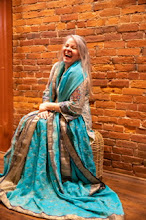
When I applied for the MFA program at Pacific University, my critical essay on this timeless piece of fine literature is what secured my ticket...
To appreciate Edith Wharton's Pulitzer Prize winning novel, The Age of Innocence, you have to understand the almost forgotten practice of moral obligation. In our “Sex and the City” subculture, moral obligation means breaking up one short-term relationship via email ten minutes before having sex with a next-door neighbor. Even if the chocolate fountain, the ice sculpture, and the rainbow-tinted doves have been reserved, a simple click on the internet can delete all evidence of the mishap, and a few regretful emails can notify everyone that the wedding plans are off until further notice.
Set in upper-class New York City of the 1870s, the story revolves around a time when marriage rituals, especially of the wealthy, were sacred, unmovable, and intentionally frozen in an unbreakable mold. Through the events and imagery of this story, however, Wharton's tremulous undercurrent warns that blind adherence to this matrimonial taskmaster will eventually bring about unnecessary suffering and loss.
Scorsese's film version of this, my all-time favorite book and film, shows Newland Archer (Daniel Day-Lewis) having relentless self-control to walk away from his unquenchable passion for one woman, the scandalous Countess Ellen Olenska (Michelle Pfeiffer) to consider the best interest of another, namely his puritanical fiance, May Welland (Winona Ryder).
Even when Newland notes how May “burns like a young maple in the frost, and how he was proud of the glances others turned on her," he fails to recognize that his lack of warmth for May while she’s in her best form would cause this young maple in time to dry up and wither, leaving behind only the bitter frost of rejection.
Newland’s decision to continue with the marriage plans not only deprives him of his own future happiness; it likewise forces May into a cold and loveless marriage where she would only represent the “steadying sense of an unescapable duty” (208). The Countess Olenska, May’s not yet divorced cousin, tries to break out of the system by asking Newland if he is very much in love with May. But instead of a direct answer, Newland responds, “As much as a man can be." Obviously, since he could not bring himself to admit to the countess that he was indeed in love with May Welland, then May Welland is the last person Newland Archer should be marrying.
Shortly before the inevitable wedding, Newland helplessly confesses to Countess Olenska: “But you are the woman I would have married if it would have been possible for either of us." Olenska painfully rebukes him: “And you say that––when it’s you who‘ve made it impossible?” Countess Olenska rightfully blames Newland for his tepid ignorance in abiding by the rules of the moral taskmaster, yet she also allows his loyalty to tradition to shatter their chances of happiness and convinces him to stay with May.
Newland Archer, May Welland, and Countess Olenska all suffer the losses of painful decision-making. As Newland staggers off from his wedding day, which was “fresh, with a lively spring wind full of dust," he winds up in a dustbowl of regrets, leaving him with morbid thoughts toward his new wife: “Yes, May might die––people did: young people, healthy people like herself: she might die and set him suddenly free." In the meantime, Countess Olenska becomes “almost unthinkable, remaining in Newland’s memory simply as the most plaintive and poignant of a line of ghosts."
Even though Newland Archer promises Countess Olenska that “nothing’s done that can’t be undone," he chooses to follow the predestined ghosts of his frozen ancestors. After a long-enough time, May Welland eventually dies––with one hand on the frigid innocence of hope and the other on the frozen bitterness of duty.
The last scene of this mind-boggling story has a much older Newland Archer with his grown-up son, standing in front of Ellen Olenska's window. I will not comment on what he does next as I would hate to spoil the ending for those hapless souls who have not yet read the book.
After reading this story four times over a sixteen-year period, it still remains on my shelf as one of the most "plaintive and poignant of a line of ghosts."


This is awesome Deb. It's so true we live in an istant gratification society with few moral imperatives. But, really when you live by that code you can subject yourself to a life of quiet misery. Bravo on this piece! Keep this blog going. It will lead to big things.
ReplyDeleteThanks John. Your blogging has inspired me to peel off that self-adhesive strip of motivation and apply myself.
ReplyDelete